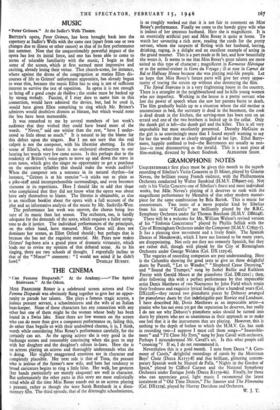MUSIC
"Peter Grimes." At the Sadler's Wells Theatre.
BarrrEN's opera, Peter Grimes, has been brought back into the repertory at Sadler's Wells with the same cast (apart from one or two changes due to illness or other causes) as that of its first performance last summer. Now that the unquestionably powerful impact of the opera has lost its initial force, and one has been able to come to terms of tolerable familiarity with the music, I begin to find some of the scenes, which at first seemed most impressive and exciting, already losing their virtue. That church-scene, for instance, where against the drone of the congregation at matins Ellen dis- courses of life to Grimes' unfortunate apprentice, has already begun to wear thin, because the music Ellen has to sing is not of sufficient interest to survive the test of repetition. In opera it is not enough to bring off a good coupe de theatre ; the stroke must be backed up by strong melody. Puccini, if I may dare to name him in this connection, would have admired the device, but, had he used it, would have given Ellen something to sing which Mr. Britten's admirers would doubtless dismiss as blatant, but which would none the less have been memorable.
It was remarked to me by several members of last week's audience that they wished they could have heard more of the words. "Never," said one wittier than the rest, "have I under- stood so little about so much." It is natural to lay the blame for this defect upon the singers. But I am not sure that the real culprit is not the composer, with his librettist abetting. In this- scene of Ellen's, where there is no orchestral obstruction to our hearing her words very few came across. Is this perhaps due to the tendency of Britten's voice-parts to move up and down the stave in even notes, which give the singer no opportunity to get a purchase on the operative syllables that should *make the words audible? When the composer sets a sentence in its natural rhythm—for instance, "Grimes is at his exercise "—it sticks out as plain as a pike-staff amid incomprehensible surroundings, and even becomes tiresome in its repetitions. Here I should like to add that thclse who complained that they did not know what the opera was about have only themselves to blame. The libretto is obtainable, as also is an . excellent booklet about the opera with a full account of the plot and an informative analysis of the music by Mr. Sackville-West. The performance last week was uneven, the chorus being less sure of its music than last season. The orchestra, too, is hardly adequate for the demands of the score, which requires a fuller string- tone to do it justice. The individual performances of the principals, on the other hand, have matured. Miss Cross still does not dominate her scenes, as Ellen Orford should ; but perhaps that is because she has not the requisite material. Mr. Pears now makes Grimes' fog-horn aria a grand piece of dramatic virtuosity, which leads me to revise my opinion of that debated scene. As to his singing, there are two schools of thought. I regretfully incline to that of the "Nieces'" comment : "I would not mind if he didn't


























 Previous page
Previous page